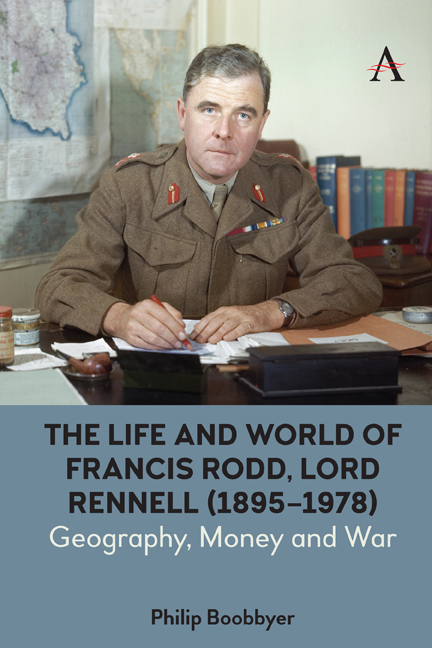Book contents
- Frontmatter
- Dedication
- Contents
- List of Figures
- List of Abbreviations
- A Note on Names
- Acknowledgements
- A Personal Note
- Introduction
- Chapter One Family and Youth
- Chapter Two The First World War
- Chapter Three Into the Sahara
- Chapter Four International Banker
- Chapter Five Negotiating with Italy
- Chapter Six West Africa, 1940
- Chapter Seven East Africa in Transition
- Chapter Eight AMGOT (Allied Military Government of Occupied Territories)
- Chapter Nine ‘Jack of Many Trades’
- Conclusion
- Sources and Bibliography
- Index
Chapter Eight - AMGOT (Allied Military Government of Occupied Territories)
Published online by Cambridge University Press: 09 February 2021
- Frontmatter
- Dedication
- Contents
- List of Figures
- List of Abbreviations
- A Note on Names
- Acknowledgements
- A Personal Note
- Introduction
- Chapter One Family and Youth
- Chapter Two The First World War
- Chapter Three Into the Sahara
- Chapter Four International Banker
- Chapter Five Negotiating with Italy
- Chapter Six West Africa, 1940
- Chapter Seven East Africa in Transition
- Chapter Eight AMGOT (Allied Military Government of Occupied Territories)
- Chapter Nine ‘Jack of Many Trades’
- Conclusion
- Sources and Bibliography
- Index
Summary
Rodd got back to Britain in mid-November 1942. In formal terms, he was still chief political officer in East Africa command. But he was uncertain about what to do next. He was also free of personal ambition on the matter – or so he claimed in a letter to Mary: ‘I do not really care what I do and shall take no active steps to do one thing or another. In these two years […] I have ceased to have any ambition to do anything else than what I was doing.’ Rodd even floated the idea with some of his friends that he might withdraw from his wartime work and go to live at the Rodd. This was met with some derision. Rodd's reputation was high. Henry Monck-Mason Moore wrote Rodd a warm letter expressing appreciation for all his assistance while working in East Africa. Platt also wrote him a letter of appreciation while also telling a mutual friend that he found him ‘sometimes encouraging, sometimes provocative, but always a stimulant’. Rodd thought it was a ‘triumph’ to be thanked by these two men, since they did not get on well together, and he had spent ‘appreciable time’ keeping the peace between them.
Rodd was, in fact, full of ideas. There was often in his political thinking a desire to promote a degree of centralisation, as he explained to Mary in April: ‘I am apprehensive, as I always have been, of the disintegration of central authority and the growth of local potentates who won't agree with their fellow potentates.’ This instinct now came out in a plan to bring order to the work of civil administration in East Africa and the Middle East. In early December, at a meeting in London called by Archibald Nye, vice chief of the Imperial General Staff, he suggested that there was a lack of coordination in the British management of civil affairs. He then produced a paper for the Directorate of Military Operations proposing the integration of the system under one person with the title of chief civil affairs officer (CCAO). This person would act as a liaison person between commanders-in-chief of different commands, and between them and the War Office on civil administration issues; a vice CCAO would be attached to each command. The idea was initially accepted.
- Type
- Chapter
- Information
- The Life and World of Francis Rodd, Lord Rennell (1895–1978)Geography, Money and War, pp. 163 - 186Publisher: Anthem PressPrint publication year: 2021



